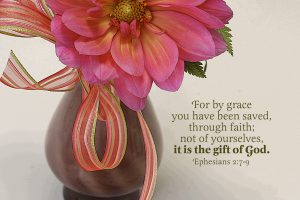No strings attached
In a letter to the Ephesians written circa 400 AD, Saint Jerome wrote “Noli equi dentes inspicere donate” (Never inspect the teeth of a given horse), a proverb which has since changed into its current form: “Don’t look a gift horse in the mouth.” Although the proverb’s form has changed over time its meaning remains essentially the same: when you are the recipient of a gift, be always grateful that the giver cared enough to freely give something to you and don’t assess its value by wishing for something more.

Gift of God
What is seldom acknowledged yet ought to be well understood is the honest debt one incurs with the acceptance of any gift. And that is to respect the act of giving with generous thanksgiving and appreciation. You may not like the gift, you may even despise the gift, but you should always appreciate and be grateful for what the gift represents, the love and generosity of the giver.
There are times when a gift comes with strings attached, threads that place a burden or set of conditions upon the gifted that are either unwanted or unnecessary. When a gift must be accepted upon condition or price it is no gift at all, for a gift freely given, no matter its size or perceived value, must be without price.
Each of us has been given wondrous gifts from God. These gifts have been given without condition, price, burden, or limitation; completely and utterly free. We can if we so desire ignore them, deny them, dismiss them, or reject them. Or we can accept them in the spirit with which they have been given, exercise them to the best of our ability, and thank God for his generosity and love.
These gifts – the three theological virtues of faith, hope, and charity – have been given to us by God to “dispose Christians to live in a relationship with the Holy Trinity.”[1] “The theological virtues are the foundation of Christian moral activity; … They are infused by God into the souls of the faithful to make them capable of acting as his children and of meriting eternal life.”[2] These three virtues are God-given gifts; you cannot find them on the shelves at a grocery store nor can you ask for more, return them, or re-gift them.
Faith, hope, and charity are integral and essential elements of your spirituality, of your soul. Each serves a specific purpose, much the same as DNA serves as the instruction manual for all living organisms while RNA carries out the instructions found in the manual. Every living organism comes with a precise and complete blueprint. We are created with two legs, two arms, two eyes, two ears, one head, one heart, and so on. It makes no sense to ask for three eyes or two hearts for to do so would make us something else entirely.
And so it is with the gifts that God has given us. When the apostles said to Jesus, “Increase our faith”[3] they had no idea that they were asking for the impossible. We have been given all that is necessary to know God and merit eternal life; nothing more, nothing less, just enough.
[1] Catechism of the Catholic Church (CCC) #1812.
[2] CCC #1813.
[3] Lk 17:5.
